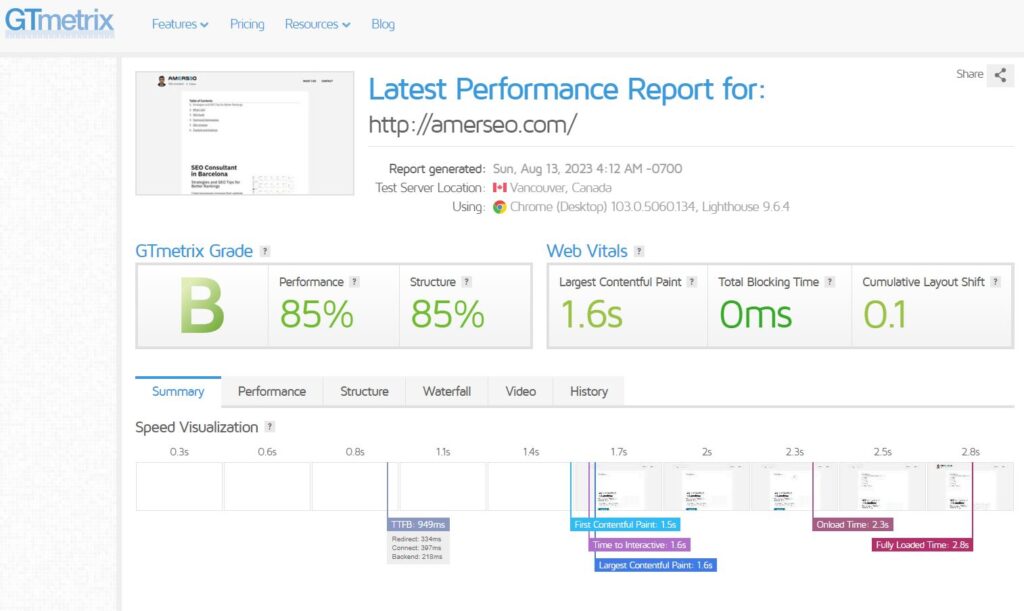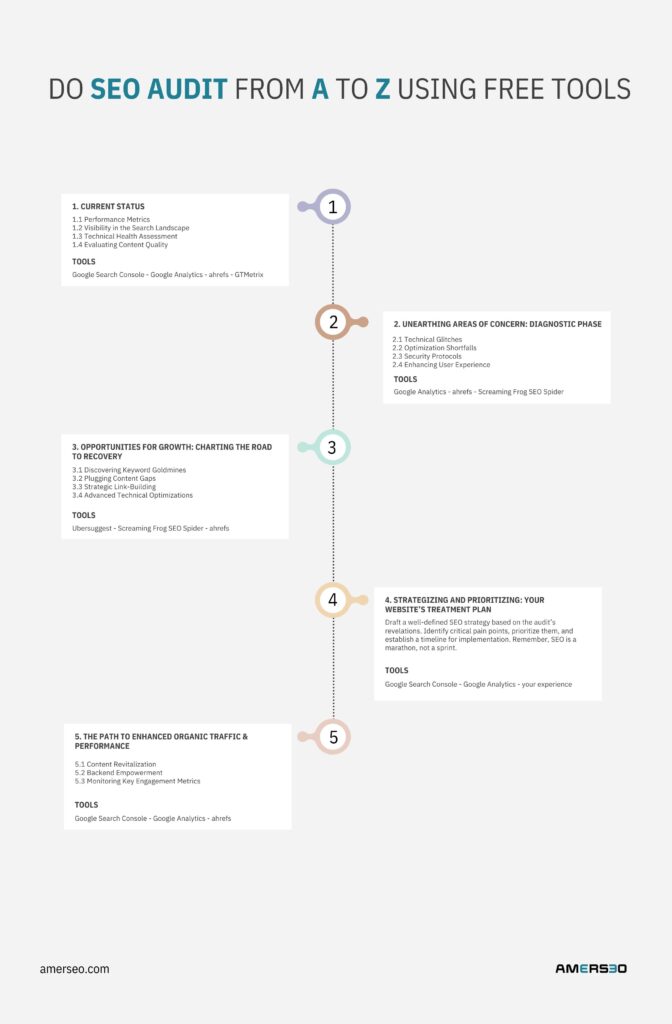Una auditoría SEO es tan importante como un chequeo de salud regular para nuestro cuerpo. Así como no pasarías por alto una tos persistente, ignorar las señales de un sitio web con problemas puede ser perjudicial.
Emprendamos este viaje diagnóstico para entender la importancia de una auditoría SEO.
1. Estado Actual: Tomando el pulso del sitio web
1.1 Métricas de rendimiento
Profundiza en la velocidad del sitio, el tiempo de actividad y los tiempos de respuesta del servidor para asegurar que tu sitio web responda de forma rápida y fiable a las solicitudes de los usuarios.
Creo que GTmetrix es la mejor herramienta para comprobar tu rendimiento (hay más herramientas listadas a continuación).

1.2 Visibilidad en el panorama de búsqueda
Descubre la posición actual de tu sitio web en los resultados de búsqueda, identificando las palabras clave principales que generan tráfico y áreas de potencial no aprovechado.
1.3 Evaluación de la salud técnica
Audita enlaces rotos, redirecciones que no funcionan o errores de código que puedan obstaculizar la interacción fluida del usuario.

1.4 Evaluación de la calidad del contenido
Examina el contenido de tu sitio en cuanto a originalidad, relevancia, profundidad y alineación con las necesidades de la audiencia y las directrices de los buscadores.
Para ello, puedes usar las siguientes herramientas:

2. Descubrimiento de áreas de preocupación: La fase de diagnóstico
2.1 Fallos técnicos
Identifica obstáculos como enlaces rotos, páginas desaparecidas o elementos de carga lenta que puedan afectar la experiencia del usuario y la indexación por parte de los buscadores.
2.2 Deficiencias de optimización
Detecta áreas donde faltan metaetiquetas, las imágenes están demasiado pesadas o el contenido no enfoca eficazmente las frases clave.
2.3 Protocolos de seguridad
Asegúrate de que tu sitio web esté protegido contra amenazas potenciales, vulnerabilidades o malware que puedan comprometer la confianza de los usuarios y sus datos.
2.4 Mejora de la experiencia de usuario
Evalúa la intuitividad de la navegación, la adaptabilidad a distintos dispositivos y la claridad general para optimizar la satisfacción del usuario al máximo.
Para ello, puedes usar las siguientes herramientas:
- Google Search Console
- Google Analytics
- GTmetrix
- ahrefs
- Ubersuggest
- Broken Link Checker
- Screaming Frog SEO Spider
3. Oportunidades de crecimiento: Trazando el camino hacia la recuperación
3.1 Descubrimiento de minas de oro de palabras clave
Aprovecha palabras clave nuevas o semánticamente relacionadas para ampliar el alcance de tu sitio web y su audiencia potencial.
3.2 Cubrir lagunas de contenido
Al comparar con tus competidores, identifica nichos o temas que hayas pasado por alto, añadiendo así más valor y amplitud a tu sitio.
3.3 Construcción de enlaces estratégica
Identifica dominios de alta autoridad en tu nicho que puedan amplificar la credibilidad de tu sitio mediante backlinks.
3.4 Optimización técnica avanzada
Mejora la velocidad de carga, aplica datos estructurados y garantiza la compatibilidad móvil para ofrecer una experiencia de usuario de primer nivel y ganarte el favor de los buscadores.
Para ello, puedes usar las siguientes herramientas:
- Google Search Console
- Google Analytics
- ahrefs
- Ubersuggest
- Screaming Frog SEO Spider
4. Estrategia y priorización: El plan de tratamiento para tu sitio web
Elabora una estrategia SEO bien definida basada en las revelaciones de la auditoría. Identifica los puntos críticos, priorízalos y establece un cronograma para su implementación. Recuerda, el SEO es una maratón, no un sprint.
5. El camino hacia un mayor tráfico orgánico y rendimiento
5.1 Revitalización de contenido
Con los conocimientos obtenidos, refina y crea contenido que equilibre las necesidades del usuario y los requisitos de los motores de búsqueda.
5.2 Fortalecimiento del backend
Fortalece la estructura técnica de tu sitio web, asegurando que complemente y potencie tus iniciativas de frontend.
5.3 Monitoreo de métricas clave de interacción
Un seguimiento atento de métricas como la tasa de rebote, la duración de las sesiones y las páginas por sesión asegurará una optimización continua, adaptándose al comportamiento de los usuarios y a los algoritmos de los buscadores.

